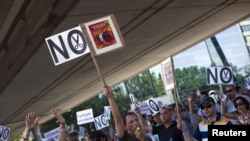Spain is facing new financial pressures, with its borrowing costs edging higher and its stock market falling amid fears it will need an international bailout.
Madrid's borrowing costs Tuesday moved well above the 7 percent interest rate level that forced Greece, Ireland and Portugal to secure international bailouts in the last two years. Investors sold Spanish stocks, with the market plunging more than 3 percent to a level last seen in 2003.
Spanish Finance Minister Luis de Guindos headed to Berlin for debt crisis talks with his German counterpart, Wolfgang Schaeuble.
Spain has denied it will need a bailout. One stock analyst, Fidel Helmer, said financial markets do not like the prospect that Spain might seek international assistance.
"Spain also wanting to get help from the bailout fund is of course a situation we do not like very much," said Helmer. "We thought at first that the 100 billion [euros] for the banks would help Spain to get out of a tense situation, but a further trip to the bailout fund would certainly be very bad."
Some information for this report was provided by AP.
Madrid's borrowing costs Tuesday moved well above the 7 percent interest rate level that forced Greece, Ireland and Portugal to secure international bailouts in the last two years. Investors sold Spanish stocks, with the market plunging more than 3 percent to a level last seen in 2003.
Spanish Finance Minister Luis de Guindos headed to Berlin for debt crisis talks with his German counterpart, Wolfgang Schaeuble.
Spain has denied it will need a bailout. One stock analyst, Fidel Helmer, said financial markets do not like the prospect that Spain might seek international assistance.
"Spain also wanting to get help from the bailout fund is of course a situation we do not like very much," said Helmer. "We thought at first that the 100 billion [euros] for the banks would help Spain to get out of a tense situation, but a further trip to the bailout fund would certainly be very bad."
Some information for this report was provided by AP.





